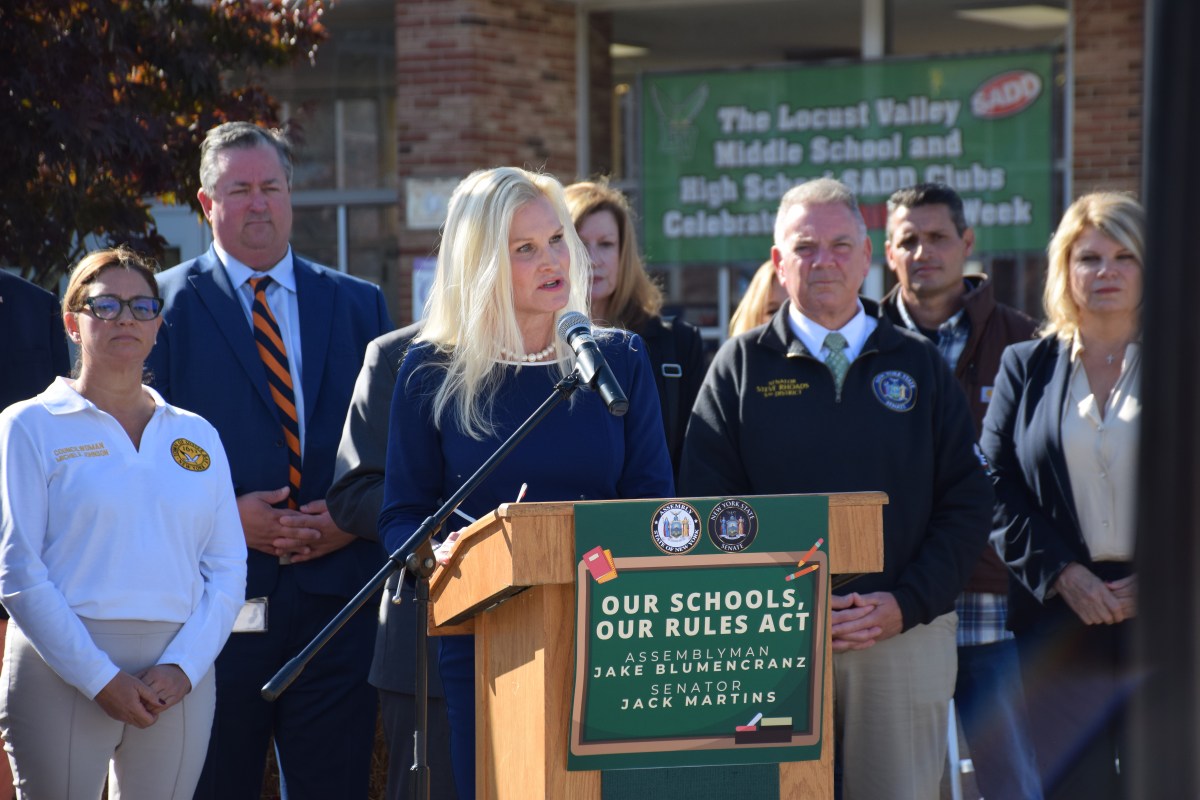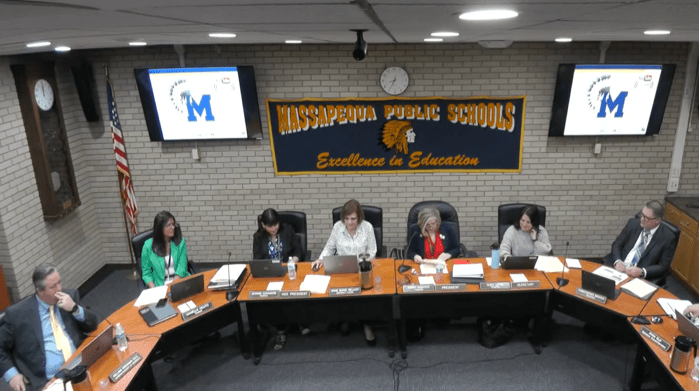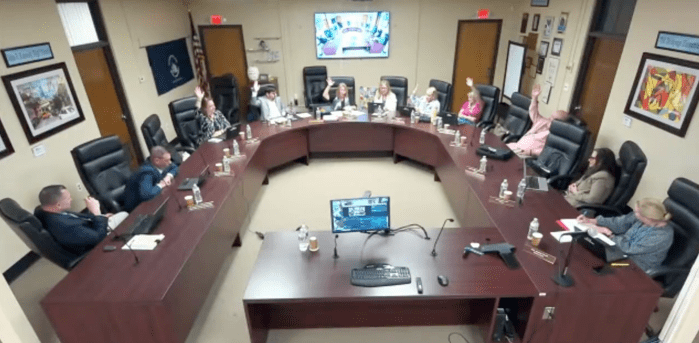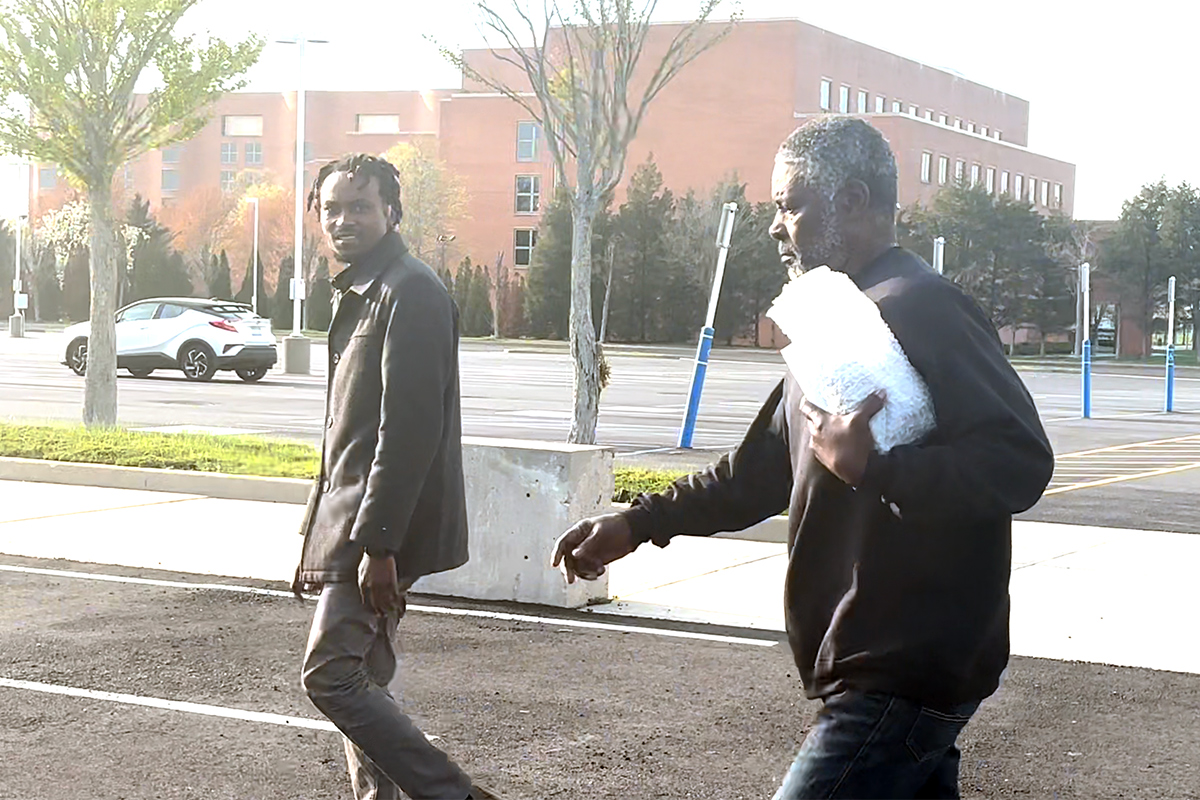School and local officials spoke out about the state Education Department’s Regionalization Initiative, which they contended poses a threat to local and district control.
The state Education Department website says the initiative aims to expand student opportunities and close regional gaps through district collaboration. The department’s website says the initiative is designed to bridge gaps in teacher recruitment, advanced course offerings and funding and aid.
Assembly Member Jake Blumencranz and state Sen. Jack Martins oppose the proposal, which was discussed Oct. 31 at a meeting at Locust Valley High School where school officials and elected officials criticized the plan.
“This emergency plan is not a democratic solution,” said Locust Valley Superintendent Kristen Turnow.
The NYSED asked for preliminary information from each district, which is due on Dec. 6, according to its website. The website says the final regional plans covering all the districts are due by Oct. 1, 2025, and the regional plan implementation will begin in the fall of 2026.
According to the NYSED website, school districts are not required to have a collaborative activity in their school’s plan, but are expected to contribute to regionalization conversations.
The department used an emergency order to gather the initial data, which is referred to as the Strengths & Weaknesses Tool.
“There is no reason for an emergency order,” said state Assembly Member Jodie Giglio. “And if there is, a letter should be sent out to all of the Legislature members in the State of New York, letting us know what they’re doing behind closed doors.”
Syosset Central School District Superintendent Thomas Rogers said both emergency regulations and ordinary regulations require a 60-day comment period before permanent adoption.
“The only difference is that if you use the emergency authority, they take effect right away. If you don’t use the emergency authority, they take effect after the 90 days, when they’re permanently adopted,” he said.
Rogers served as a Nassau BOCES superintendent for almost five years, and has about 20 years experience working with the state Legislature in Albany prior to his time at Syosset.
He said the state wants to collect the Strengths & Weaknesses Tool right away, which is why the NYSED said it is an emergency order.
In a joint statement from the Locust Valley, Oyster Bay-East Norwich, Cold Spring Harbor and Massepequea school districts, attorney Nicholas Rigano said the rule violates Education Law 3202.
“Fundamentally, regionalization will allow non-resident students to attend school or use the facilities/resources of districts,” Rigano said. “The apparent intention of the Education Department is to have the authority to ‘equitably’ allow non-resident students to use school facilities without paying tuition.”
Blumencranz and Martins introduced the Our Schools, Our Rules Act at the Oct. 31 press conference.
“It has become all too common that Albany has been overreaching into our local affairs,” Blumencranz said. “This latest attempt is forced school district regionalization.”
“This bill puts the future of our schools back where it belongs,” he said. “In the hands of our local communities.”
Blumencranz said the regionalization initiative would force districts to share resources and services.
“There is nothing in the regulation that can compel mergers between school districts,” Rogers said. “That process takes a long time and has a lot of steps in the process.”
Rogers said the NYSED does not have the power to force district mergers. The law requires both district Boards of Education and two affirmative public votes by the affected communities, he said.
In a previous report, Roger Tilles, the Long Island representative on the state’s Board of Regents, said “there seems to be a lot of misunderstanding and rumors about it.”
“We’re not looking to change local control. In fact, we’re standing up for local control. Each district can do what it wants,” he told Newsday.
Rogers said Tilles asked for an amendment clarifying that districts are not required to participate at Tuesday’s monthly Regents meeting.
“We are one island, and if we can work together to provide services and pool resources, all our kids will be better off,” Roosevelt Union Free School District Superintendent Shawn Wightman told Newsday.
Local school administrators said each district has a unique awareness of its students’ needs.
“Only our dedicated educators and administrators truly understand the unique needs of the children they serve daily,” Turnow said.
“Local districts know what’s best for their students and their communities,” Martins said.
“We are going to protect local control from any state-mandated regionalization process and decisions about budgeting, governance and programming,” Blumencranz said.
Officials said the NYSED initiative does not mention the Board of Education.
Locust Valley Trustee Margaret Marchand said New York State school officials have formed a coalition against the regionalization initiative, which already has over 100 members.
“We are up to 120 individual board members who have signed, representing 23 districts,” Marchand said. “And just this morning, we have another four districts that are signing on.”
“We are the only ones standing up in the entire state for the school boards,” she said.
Marchand said superintendents from Locust Valley, Massapequa, Cold Spring Harbor and North Bellmore represented the coalition at the event.
Marchand said present and former school board members from Locust Valley, Island Trees, Cold Spring Harbor, Massepequa, East Meadow, Elwood, Roslyn, Plainedge, Hicksville, Jericho and Carle Place also attended.
“We pay our local school taxes to make sure we have the best educational systems in the nation, and we want to keep it that way,” Blumencranz said.
Martins said the schools within his Senate district prioritize education.
“Twelve of the top 20 school districts in New York state happen to be in my Senate district,” he said.
“That doesn’t happen by chance,” Martins said. “It happens because we have school districts that prioritize education.”
“Only our dedicated educators and administrators truly understand the unique needs of the children they serve daily,” Turnow said.
Turnow said because each district has unique parameters, sharing resources is not a reasonable expectation.
“I am deeply concerned about the state’s recent emergency regulation, mandating school districts to engage in discussions about resource sharing,” said Locust Valley superintendent Kristen Turnow.
Turnow said asking administrators and teachers to collaborate is unfair.
“Asking our teachers to educate students from other districts is highly impractical,” she said.
“Schools operate on diverse schedules, calendars and policies,” she said. “How can our teachers adhere to multiple district regulations, particularly ones that may conflict with their own?”
She said Locust Valley has a no-cell phone policy, which has not been implemented in other districts.
Martins said the proposal excludes some of the worst districts in the state.
“If this was such a great idea, why aren’t they part of this? Because it’s not about educating kids,” Martins said.
Turnow said the state initiative requests data that the state already has access to.
“Our students are not mere data points,” she said.
The NYSED website says the Regionalization Initiative will be implemented on a 10-year cycle, and there will be interim progress reports.
State Sen. Steven Rhoads said the initiative would give the state information “as to which districts can be cut and which districts need supplemental funding” in the future.
The NYSED website says the Regionalization Initiative is not about consolidation, annexation or reorganization.
Rhoads said a district’s needs should be “determined by our local school board officials and superintendents.”
Rogers said he is willing to explore the state’s plan “as long as they don’t cross the red lines of local control and compulsory participation.”
The NYSED website provides a timeline, which says local development plans are due by October 2025 and regional plan implementation will begin in the fall of 2026.
“We will keep fighting for you,” Giglio said.

































